“Son, you need to meet Hall,” he said.
“Hah?” I asked.
“Hall Watters. Coolest, most amazing man you’ll ever hang out with,” Kit said.
“What’d he do?” I asked.
“What didn’t he do is the real question,” Kit said. “He did it all.”
Most of my time spent with Kit was either in the woods or on the ocean. He taught me how to hunt spring turkeys, look for deer sign, rig ballyhoo for sailfish, and jig gray trout. Every ride with him was an education. If Hall had Kit’s endorsement, I figured this had to be good. In the next few minutes Kit briefed me, and I was hooked.
Born in 1925, Hall Watters was a retired spotter pilot who had logged more than 60,000 air hours for the North Carolina menhaden fishing fleets. In the process he’d discovered countless shipwrecks along Frying Pan Shoals off Cape Fear, making them out from the air and returning to dive their treasure and catch fish. He rescued capsized fishermen. He landed his modified Piper Cub on the beach to cast light spinning tackle in the surf for huge red drum long before it was cool.
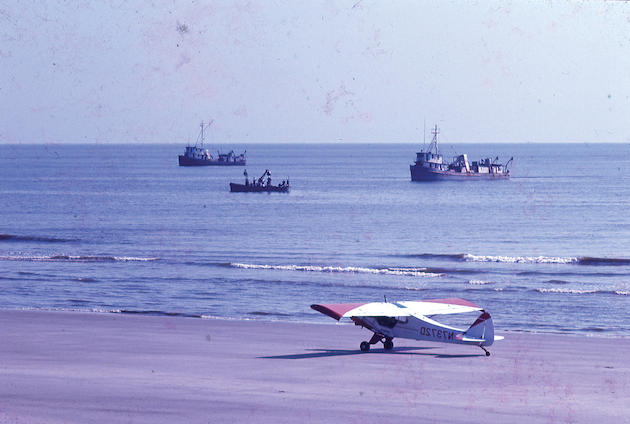
Hall Watters’ Cessna idles on a North Carolina beach while the menhaden fishing boats he’d guided make their sets close to the shore.
A passionate hunter and world traveler, Hall’s true calling—whether in fishing and hunting or not—was discovery. He found black duck holes in the marsh from his plane, and may or may not have strafed them with corn. He had even solved the mystery of a commercial air sabotage that left the plane’s wreckage scattered around Wilmington and Southport in 1960. At the age of 80, he still shoveled mud with his son on a dredge boat and hunted any chance he could get.
The first day I met Hall, when I ducked into the shade of his garage with a bushel of sweet corn, he was gluing together the wing bones of a turkey to make a yelper. He wore a long-billed fishing cap and aviator glasses around his neck hitched to a thin cord. He flicked his hand and waved me over, head tilted, eyes grinning. A tumbler polished empty rifle shells on a table to his right. All around him were piles of things: flight manuals, deer antlers, and bronze turkey pelts. The garage smelled like wet acorns and gasoline.
“Let’s see what we can find in the house,” Hall said.
I stepped inside, wiping my boots, and Mrs. Rosa Lee Watters was there, tiny and warm and smiling. She cupped me forward with a hand, “Come on in young man and sit,” she said.
“Come on in here, son,” Hall motioned, “in here to the den.”
I walked in past a wave of something bubbling on the stove, country ham overpowering green beans, and I sat on the edge of a day bed beside Hall who began pulling pictures and slides from worn-smooth boxes. I could see big purse seine net boats, a man in aviators kneeling with a huge red drum, aerial shots of wooded islands, someone holding a strap of mallards. He pulled them out and patted them straight with his work-curled hands, tapped the pictures into groups on the quilt, looked up at me and chuckled, eyes pale as the middle of the sky at sunrise.
“What do you want to know?” he asked.
“I want to know everything.”
As we flipped through the photos, Hall told me about his life as flyer, waterman, and hunter. There were shortcuts in his dialect, pure Southeast and full of cypress and salt. His was the voice of fishermen on the VHF radio, of pilots and dockhands and watermen — some level of toughness tempered with a tendency to care. The voice hung in the hurricane pine-paneled walls.
Hall had taken a job with Standard Products as a menhaden spotter pilot in the ’50s, settling in among the fishermen and flyers in Southport. During that tenure, to be blunt, he became a complete badass. His level of competency — as a pilot, fisherman, and hunter — was as unmatched as it was widely unrecognized. With little fanfare, he often found capsized boats and saved fishermen. In the rare moments of trouble for himself or anyone else in a plane, he calmly figured out how to escape.
My favorite rescue story was when he saw an upside-down American flag (a distress signal) flying on the south beach of Smith Island, which is now a resort called Bald Head. At the time it was a wild maritime forest full of deer and pigs, freshwater ponds, vast saltmarsh, and mosquitoes. It was dead summer, and some marines from Camp Lejune had been covertly dropped empty-handed on Smith Island for survival training. Hall circled back and landed his plane on the beach.
Gaunt, sunburned soldiers emerged from dunes and told him one of their buddies was dying of dehydration and exposure. Hall shuttled the young marine to his plane and carried him to the hospital, telling them he’d be back to check on them. When he returned, the men told him they were all thirsty and starving.
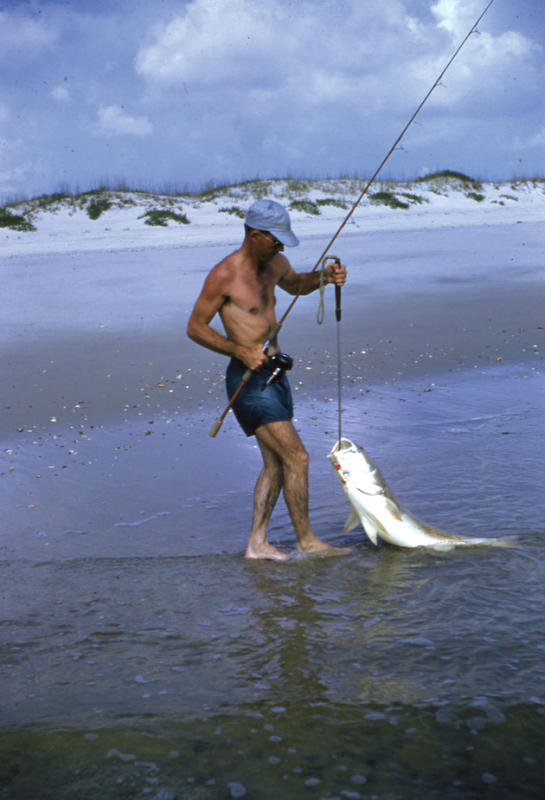
Watters pulls in a big red drum he caught on the east beach of Smith Island, now Bald Head Island.
“I told ’em they were living in the land of plenty,” Hall said, his eyes twinkling.
Then he pulled a haul seine and some clam rakes out of his plane, gave them water, led them over to Bald Head Creek and pointed out clam banks and good places to drag the net. He came back and visited with them more than once, and he told me on his last flyby the men were all settled in by a campfire, bellies swollen, a pile of clamshells you could hardly see over next to them.
Back home, sometime after ten and before midnight, I sat up in bed as the moon drew water over the marsh out past our dock. Redfish turned up on their heads and sucked fiddler crabs out of holes, tails exposed and glistening. A plane hummed over the bones of the menhaden plant across the waterway from my house where Hall used to meet his crew, pick up his paycheck, lift his plane from the adjacent grass strip, and buzz out over the river.
I walked outside and felt the southwest wind dying. The black dog ran out and kicked around in milky light, wanting me to throw a tennis ball. I looked eastward at the moon-spun marsh, at Hall’s old airstrip, at the hulking, rusted fish factory, and thought about how much more I wanted to do. I thought about the level of aeronautical and nautical competence in the man I’d met earlier that day — this man who’d probably passed more sea buoys than most men had telephone poles. One particular story Hall told me about a near disaster came to life as I stared out across the dark flats.
I imagined Hall on the Southport waterfront, feet in a pair of sandals, heels draped over the old rock wall where Civil War had crumbled off into the brackish river. He watched the edge of the tide breathing in against the scattered concrete and rusted metal, lapping in a rhythm that meant some skiff had passed. Five-inch waves every three-seconds, he thought, counting. Maybe a flounder boat in from gigging.
He thought of the man at the tiller handle out in the night, steering, looking at everything and nothing all at once. He breathed in a gulp of the Cape Fear. Wondered if the man had stuck some big doormat fish, and where he’d been. Probably on that sand flat behind Battery Island. He put himself in the open boat, leaning into the wind. He wondered who it was.
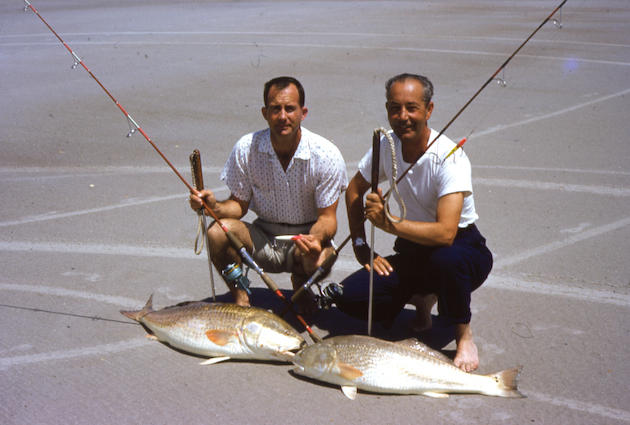
Two heavy red drum.
At night the river was a place where air and water met in quiet, inky dark. Yaupon trees, live oaks, myrtle, and the rotting marshes and the spitting oysters. Spice, sweet, salt and mud. It was June, and the smells were thick and heavy. Creeks opened, the once green grass turned black and blacker, the heron flushing across your boat even darker still, every new thing in water and air a shadow of everything else. Half the world was asleep — the stalker birds, the old Southporters quilted away in tall homes. But you and the night herons, and a river full of fish were wide awake.
Hall stood up and stretched his tight shoulders and rubbed his eyes. Walking up toward Howe Street he dragged his hand over the round whittler’s bench and breathed in the cedar. The fried bread smell of hushpuppies wafted through. He thought about tomorrow, the long flight out over Frying Pan Shoals to his boats. Thought about looking for some big red drum in the surf on the way home and maybe landing his Piper Cub on the beach.
No one else was flying this week, and the menhaden were a good ways offshore. He would be solo, and there was no fear in him, but his adrenaline was a metal taste that he swallowed. And every night after every day of flying he looked up into the black sky at clouds and stars and sometimes a waning moon and nodded, and said, “Okay.”
He thought about Rosa Lee and her supper back home. Southport’s grass air strip split the two fish factories and their creosote wharves, and the runway launched small planes over the Intracoastal Waterway, then the Elizabeth River marshes, then a narrow strand of oaks and beach to Fort Caswell, then the river mouth and a South-facing sea.
In his mind’s eye Hall found his line in the Southwest breeze, airstrip placed accordingly to that prevailing wind, and flew himself across the shoals. He tried to think of his wife and kids and supper. But he wondered more about the great clouds of menhaden, about how his fleet would make out, about the long flight out the shoals and back by himself.
The next morning was still night when Hall walked into the fishermen’s kitchen. A giant black man was scrambling eggs in a bowl, deer sausage already cooked and draining on a brown bag beside him.
“Thank you so much for the deer meat, Mr. Hall,” the man said.
“You’re welcome,” Hall said. “Need something in your belly to get that damn Tom weight overboard,” he added, chuckling, thinking about how much strength it took to heave the 40-pound lead that anchored the purse seine.
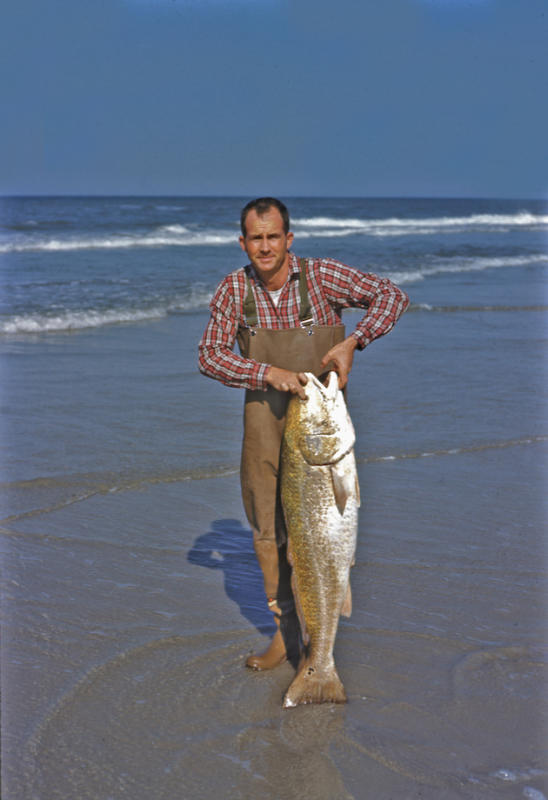
Hall Watters struggles to lift a huge sow red drum on Smith Island’s east beach.
“Yes sir . . . need something in you,” the man said, polished I-beam arms still mixing the eggs.
As light came, Hall wolfed some breakfast and went to the new plane, taking inventory of rivets with his fingers and wiping dew off the cowling. Some boys down in Florida had flown in the new Cessna for him to try. He tasted the metal in his mouth again and shook his head. Grabbed a small fiberglass fishing rod and reel from his truck, a few casting plugs, his aviator glasses, a small skinning knife and a jug of water and stowed them in the plane. He checked fuel and oil, flipped the radio on and squelched past the static. Then he turned the engine over, letting the vibrations settle into his body and ears until the hums of the motor and propellers crossed, harmonized, synced up and the plane felt ready to fly.
He lifted up over the glassy waterway before the boats launched, banking over Oak Island. White birds — egrets and ibis — scattered below him in the green marsh. Never gets old, he thought, pulling back and gaining altitude. He could see the ocean and the light southwest chop making foam, white on sea green. The synchronized hum drifted away from itself for a millisecond, and Hall felt it in his legs before it regulated again.
“Damn new plane,” he said out loud, wishing for his old Piper Cub. He had taken apart and rebuilt each of his planes, knew their sounds, their feel and their moods. This was the first time he’d run a new plane for someone else.
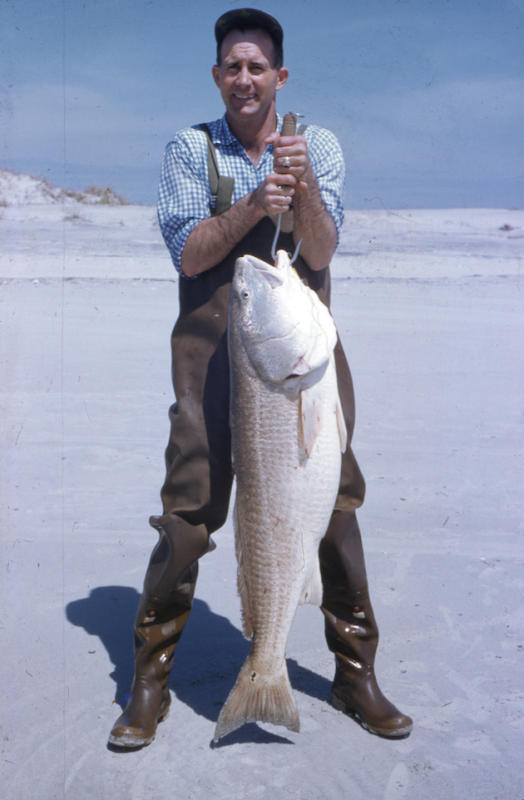
Hall Watters with a 40-plus pound red drum on Smith Island, with Frying Pan Shoals breaking in the background.
Farther off, the green water deepened and turned dark blue. He circled back with the boats and watched their pale wakes fade away. Somewhere off a shoal eddy, he saw the shadow of an old wreck lying in what seemed to be about 25 feet of water. He retraced the flight in his mind, miles out, course heading, signature of water foaming through the shoals. The depth and location told him it would be a nice place to fish, and if the wreck was undiscovered, a heckuva a thing to dive. He banked the plane again, and like a bird dog working ahead of hunters, pointed southeast, leaning more east, until he saw the cloud of fish on the horizon.
When he was over the football field of menhaden, he adjusted the volume on his shortwave radio and keyed the mic button.
“Got ’em, east of the tower . . . big school making up.”
“Roger that. We’re almost there.”
Hall pulled in over the fish and slowed his plane, almost hovering like a kingfisher. Holding opposite ends of a net, the Cap and Mate boats pulled out from the converted Naval destroyer and worked evenly around the school, listening to Hall’s radio commands as they went. The giant man who’d made eggs and bacon lifted the tom weight up, overboard, and the net plunged over and around the boil of baitfish. It was a good set, cutting off a piece of the school like Hall wanted. If they’d struck the whole lot, the menhaden might have thundered and blown the net open, ruining gear, and a hundred-thousand-dollar catch.
As the men hauled in the swollen bag alongside the big destroyer below him, Hall felt the wrong vibration again, this time in his foot. He looked down, and could see his right knee in a shimmy, then pumping like a sewing machine. He was a long way from Southport. He radioed down quickly.
“Going home. Something ain’t right . . . might need to ditch, gonna fly the west side of the shoals.”
“What’s up with it, Hall?” the boat captain asked.
“Don’t know. Something just ain’t right.”
On the way home, things disintegrated. Both foot pedals began vibrating so much he could barely keep them steady. Dials on the dash jumped and spun. He knew it was something electrical, but couldn’t pinpoint anything quickly enough. Halfway down the line of shoals he started taking inventory of things. Lifejackets, flares. In the shuddering cockpit, he thought about Rosa Lee again and wished he’d had breakfast at home.
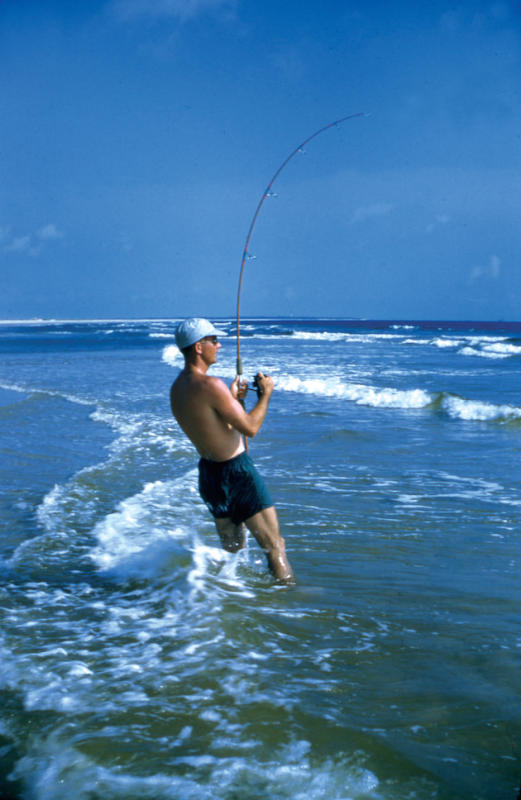
Although he loved both angling and hunting, Watters was passionate about surf-fishing.
Right when Bald Head Island showed as a brown hump, the propeller sputtered to a stop. He pushed the fuel mixture back to the plane, fired it up on the dive and she cranked again. In a minute he was over land, skimming oaks and watching the river blur beneath him. Drum-fishing would have to wait. He pulled up again, judging the distance from the Elizabeth River to the runway. At the right height, he pulled the mixture away, choosing to glide in rather than risk the shot engine. Wires burned somewhere, and everything went quiet as he slid down a quartering tailwind, over the bridge and down onto the soft runway.
When the crippled plane rolled to a stop, he got out with his fishing rod and walked to the truck. He never said a word and never looked back at plane. He drove over the bridge, looked out across the river toward the shoals and shook his head. Rosa Lee was at still at work at the Singer Sewing factory, he realized, getting home so early. He flipped through a Rolodex to the Florida number he wanted and dialed the rotary digits. Someone picked up with a cheerful, “Hello?”
“Tell them this is Hall Watters and to come get their goddamn plane,” he said, and hung up. Then he called his cousin, Punky Kure.
“Hey, it’s Hall.”
“Thought you were flying today.”
“Got home early, you want to take the boat to a wreck I marked?”
“Sure, pick me up at the house.”
I wake up stiff from the wind-beaten charter the day before, pop my joints and find jeans and sweatshirt near the bed. Fall air has begun its seep into the shack, creek water lapping at the floorboards. I walk to the kitchen and look out at an osprey working on the glassy high tide. The world is pine green and liquid, treelines and marsh grass burned yellow in the underhand morning sun.
As per usual on an off day, the wind is sucked away somewhere, not touching any corner of the water behind my house. Three center-console fishing boats and a whitewashed shrimp trawler cross in the waterway. Then two skiffs, Tom the crabber with his pelican perched on the outboard, Ivey Gaskill with the net reel in the stern. The spots are running, I think, and crabbing is probably peaking out.
We had crushed the gray trout about ten miles off Oak Island two days before, keeping a few, releasing a good 70. I call Kit.
“Whataya say there, Young’n.”
“Tell me a deer story, Mr. Kit.”
“Seen a few good ones.” (Chuckle)
“I hear you.”
“Tell me a fishing story, son. Gray trout bitin’? You still getting to meet with Hall?”
“Yes sir. Hammered the grays two days ago, and they were gone yesterday, but it blew a gale. Hall is pretty amazing,” I said.
“He’s the original, son. The first and last of his kind.”
When my fishing charters fizzle out and late November dives in, I drive north from the shack to Hyde County for opening day of duck season’s second split on Lake Mattamuskeet. I stay with friends in a cabin on the south side of the Pungo River, arriving Friday just before dark in a torrential rainstorm. We shoot a strap-full of big duck — pintails, widgeon, blacks and teal. I still have the birds draped over my shoulder when my phone rings — surprising in a place with hardly any service. Kit. Even through the bad phone connection, I can hear his voice cracking.
“Son, I hate to be the one to tell you this.”
“What?” I ask.
“Hall’s gone.”

You can’t park that tarpon there.
Hall Watters had bundled up Friday evening and gone deer hunting. He climbed into his tree stand in the rain, shot a doe sometime in the morning, loaded the deer in his truck bed and got in the cab. Right at dusk his hunting buddies found him slumped in the seat, dead of a massive heart attack.
Silent for a minute, I finally figured out how to ask Kit where Hall was hunting.
“Bruce Cameron’s property. On the north side of the Pungo River.”
“I’m right across the river from there,” I say.
“Let me go before I can’t talk about it any more,” Kit says, signing off.
I look across the white-capped river at a clump of pines, and I shiver, numb to my toes. Just like the rest of Hall’s life, it couldn’t have been scripted any better. He had spent his last hours doing what he loved. I went to picking birds through blurred eyes.
All I have of Hall are the stories and a handful of hours spent listening, but I’m suddenly taking inventory of so much more. In the pauses, those moments in his garage when I looked around the mementos of his life, Hall taught me the value of work and the true measure of what people can accomplish. In those moments I learned how to be confident and humble at the same time.
He landed in the sand on wild barrier islands where Lejune’s soldiers trained to survive Vietnam. He skimmed across sunken liberty ships, blockade runners, U-boats, and acres of fish — marking, diving, navigating, even lifting the brass props off ocean-liners with homemade air bladders. He could fly over the open ocean, find a sunken wreck, mark it, drive a boat to it, dive its treasure, donate what he found, go back with a fishing rod and go to bed with nothing more than grouper sandwiches in his belly and a memory. In my mind, there’s not much he couldn’t do.
I loved to hear about schools of red drum on the beaches, piled through the shoals from Rich’s Inlet to Bald Head. How he might send Kit Taylor over a dune after speckled trout, or land his own plane on the beach to cast a plug in the surf. Hall broke light-tackle records for red drum long before it was cool to fish with light tackle or talk about redfish. I don’t think he ever even told me a full hunting story or bragged about a big animal, and yet he probably knew more about wild game than anyone I’ve met.
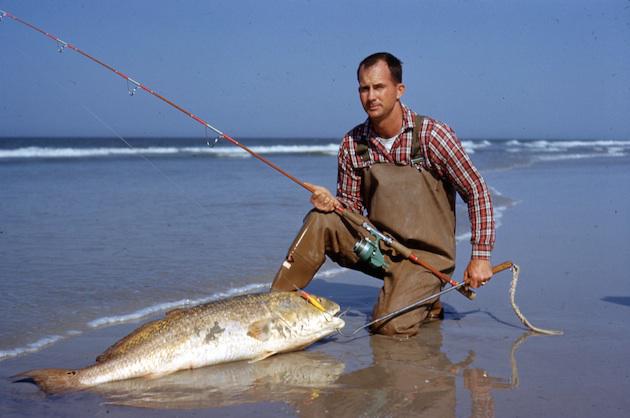
Another shot of Watters’ drum.
In life you meet people who take a side, who live for themselves and their opinions and their professions. I’d venture to say that there’s nothing wrong with that. But Hall showed me something else. He was just as critical as he was proud of the menhaden fishing industry, never afraid to just be honest about it. And he didn’t help solve the mystery of Flight 2511 in 1960 or rescue capsized fishermen to be a hero. He did it because it was the right thing to do.
Looking out my kitchen window over the creek and toward his old runway, I figure he’s in the cockpit of his Piper Cub, cruising somewhere about 10,000 feet, watching the edge of this cold front ease across the Cape Fear. He’s talking to someone on the radio, looking straight ahead while his eyes move behind those shades. He probably saw a few deer scatter below the runway this morning and watched the ibis going to feed, and spotted the hint of a new wreck resting in a shoal. And if there’s a school of fish in that ocean, whether drum along Cape Fear or some lost pod of menhaden boiling offshore, he’ll find them.
Editor’s Note: This article originally appeared in the 2015 May/June issue of Sporting Classics.
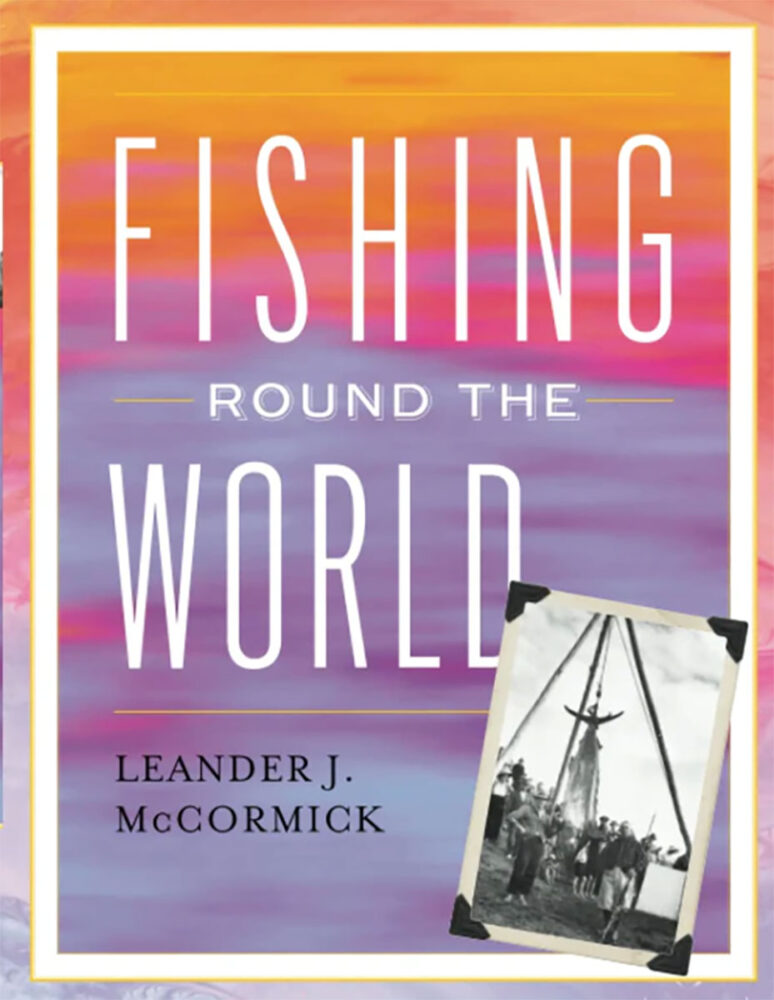 Leander McCormick literally fished his way around the world. These many miles produced a catalog of stories in his book. From his first perch on the shores of Lake Michigan, to youthful pursuits of eels in England, to ultimate angling for the giants of the sea, he demonstrates a deep insight into both the fish and the people who pursue them. Having angled for and caught dozens of different species of fish, McCormick dryly comments, “Some were more sport to catch than others, but I assert that all fishing is good, though some is better.” Buy Now
Leander McCormick literally fished his way around the world. These many miles produced a catalog of stories in his book. From his first perch on the shores of Lake Michigan, to youthful pursuits of eels in England, to ultimate angling for the giants of the sea, he demonstrates a deep insight into both the fish and the people who pursue them. Having angled for and caught dozens of different species of fish, McCormick dryly comments, “Some were more sport to catch than others, but I assert that all fishing is good, though some is better.” Buy Now



